One of the questions I’m most frequently asked is, “What’s the best way to stay focused on my goals?” The following story will give you the experience I had so you’ll better understand my process. Take from it what you will, but this story reflects how I plan to say focused on my biggest goals in the future.
Your Story Starts
The statement was simple, but its impact startled you.
Your intellectual property lawyer, Jeremy, was giving you basic information on copyright law for the book you were writing. The email exchange should have been pretty dry, but his reply hit you like an unexpected dodgeball to the face. He gave you all the information you asked about: when to file for copyright, cost, and what the process looks like. But he also dropped a bomb on you.
Just above his signature, as an encouraging gesture, Jeremy wrote:
“Look forward to the book. I bet it will be a real page-turner!”
Verbatim, exclamation point and all. You smile to yourself as you read the line, but you quickly frown. You frown hard. Your book isn’t “a real page-turner.” You haven’t even finished it, yet. You have five months before your projected launch date in October and you are far from a finished product. But in that moment you know you want this book to be, “a real page-turner.”
You sit back in the office chair stationed at your roll top desk and stare at your laptop. You clasp your hands over your head and mull the statement over in your mind. Even if he was just being cordial, Jeremy just gave you a valuable piece of inspiration.
You quickly pull the handle to your left where you keep your dry erase markers and grab the first thing your fingers find. You turn left and write, in bold letters, “A REAL PAGE-TURNER.” You study the marker board while your fingers replace the cap and stow your black marker back in its cubby. You mouth the words, “A real page-turner.”
Ongoing Influence
The saying on your marker board becomes a mantra you repeat to yourself. You see it daily. You replay it to yourself on long runs in the blistering July heat as motivation. As you write, you let that statement determine how you end chapters and how you build intrigue through the book.
You realize you don’t have all the tools you need at your disposal so you seek help. You pursue people who have published written works, people who may be able to mentor you. John, the man you eventually meet with, has published a book and runs a magazine. He’s helpful and generous with his time. He seems to want you to succeed. He offers two things: the opportunity to write for the magazine and a pair of books to influence your writing. You jump at both!
You pen a piece for the magazine and his feedback on it is invaluable. He tells you to go deeper with your story. He encourages you to interview people you wouldn’t think to interview. He tells you to transport people to what you “see” when you are writing. Some of his edits to your story sting, but you asked for his opinion, you have to have thick skin if you want to improve your skills. It’s a short story, only 800 words or so, but you get positive feedback and readers tell you it kept their attention. You grow from the experience and you’re able to apply the lessons learned to your book writing process.
While you’re writing the piece for the magazine, you pick up the books he gave you. They look a bit dull, not what you’d normally read, but you view the books as a challenge. When you get through them, you’ll be better for it. Fortunately, they aren’t dull, they’re helpful. Extremely helpful.
You rip through the first book dog-earing pages and scribbling notes in the margins. Glad he didn’t want these back from you… The first book teaches you about creating cliff-hangers and the arc of a story. It teaches you how to develop characters and gives advice on proper tense.
You start the second book the same day you finish the first. It’s also helpful, but in different ways that complement the first. You find better words for certain sentences. You shorten sentences. You draw some out using vivid details and specific imagery. You finish both books in record time, considering the amount of notes you took, and you immediately re-read your notes to make sure you didn’t miss anything. You’ve been applying your newly acquired skills to your book and your checklist intended improvements grows.
Time passes and you toil over the book, working for endless hours each day to bring it to life. You spend so much time on it that you must quit your part-time job to focus on the book. You publish the book on December 3rd, 2015. Like an overflowing beer mug, you are filled to the brim with anticipation and nervousness. You have no idea how people are going to react, all you can do is wait…
December 7th one of your teammates tags you in a Facebook post:
The Law Of Attraction
I realize I have opened myself up to significant criticism by talking about the law of attraction, but it was an important part of the above story. The law of attraction (LOA) is the idea that, “focusing on positive or negative thoughts a person brings positive or negative experiences into their life.” Yes, a bit mystic. Yes, a bit woo-woo. But also, in my case, a bit true.
I had heard about the LOA, but didn’t know what it was until after I’d already written (and subsequently erased) Jeremy’s quote on my marker board. After I read a few blog posts about the idea, I realized I had already read a book about it (Think and Grow Rich by Napoleon Hill). To dig deeper, I watched a movie about it as well.
The premise of the LOA is simple: visualize the things you want and they will come to you if you stay grateful and focused. I do that all the time, I just call it goal-setting.
Many people don’t keep their new year’s resolutions because they don’t work at them. In religion, it sounds like this: “I’m waiting for God to provide me with (fill in the blank).” God will provide, but you have to take action. He (or the universe or whatever you believe in) is much more willing to re-route your actions than He is to force you to take action. You can accomplish your goals and keep your resolutions, but you have to make strides toward that end.
Taking Action
I have shared ways I stay focused on my goals in the past, so I won’t repeat myself. I am experimenting with daily affirmations in which I repeat my biggest goal to myself every day. This can be me talking to myself in the mirror, it can be writing the thought down on paper, or just saying it out loud while I run. I’ve never employed the LOA before, so I’ll report back later.
How do you stay focused on your goals? I’d love to hear from you in the comments or on Twitter.
# # #


